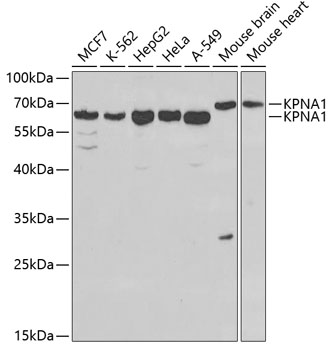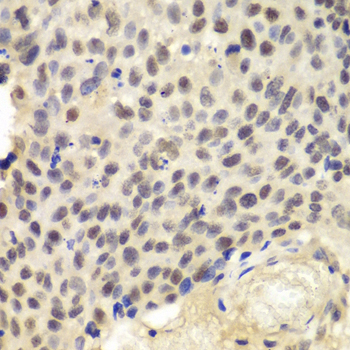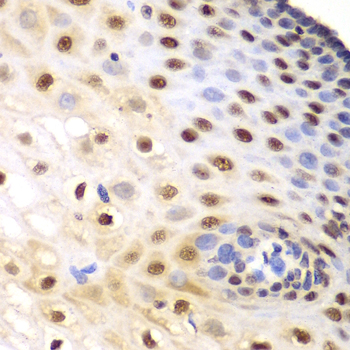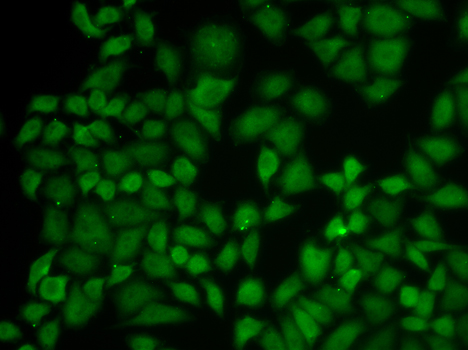Product Name :
KPNA1 polyclonal antibody Background :
The transport of molecules between the nucleus and the cytoplasm in eukaryotic cells is mediated by the nuclear pore complex (NPC), which consists of 60-100 proteins. Small molecules (up to 70 kD) can pass through the nuclear pore by nonselective diffusion while larger molecules are transported by an active process. The protein encoded by this gene belongs to the importin alpha family, and is involved in nuclear protein import. This protein interacts with the recombination activating gene 1 (RAG1) protein and is a putative substrate of the RAG1 ubiquitin ligase. Alternative splicing results in multiple transcript variants. Product :
Rabbit IgG, 1mg/ml in PBS with 0.02% sodium azide, 50% glycerol, pH7.2 Storage&Stability :
Store at 4°C short term. Aliquot and store at -20°C long term. Avoid freeze-thaw cycles. Specificity :
KPNA1 polyclonal antibody detects endogenous levels of KPNA1 protein. Immunogen :
Recombinant fusion protein containing a sequence corresponding to amino acids 1-300 of human KPNA1 (NP_002255.3). Conjugate :
Unconjugated Modification :
Unmodification
KPNA1 polyclonal antibody Background :
The transport of molecules between the nucleus and the cytoplasm in eukaryotic cells is mediated by the nuclear pore complex (NPC), which consists of 60-100 proteins. Small molecules (up to 70 kD) can pass through the nuclear pore by nonselective diffusion while larger molecules are transported by an active process. The protein encoded by this gene belongs to the importin alpha family, and is involved in nuclear protein import. This protein interacts with the recombination activating gene 1 (RAG1) protein and is a putative substrate of the RAG1 ubiquitin ligase. Alternative splicing results in multiple transcript variants. Product :
Rabbit IgG, 1mg/ml in PBS with 0.02% sodium azide, 50% glycerol, pH7.2 Storage&Stability :
Store at 4°C short term. Aliquot and store at -20°C long term. Avoid freeze-thaw cycles. Specificity :
KPNA1 polyclonal antibody detects endogenous levels of KPNA1 protein. Immunogen :
Recombinant fusion protein containing a sequence corresponding to amino acids 1-300 of human KPNA1 (NP_002255.3). Conjugate :
Unconjugated Modification :
Unmodification
-
 Western blot analysis of extracts of various cell lines, using KPNA1 antibody at 1:1000 dilution.
Western blot analysis of extracts of various cell lines, using KPNA1 antibody at 1:1000 dilution. -
 Immunohistochemistry of paraffin-embedded human lung cancer using KPNA1 antibody at dilution of 1:100 (40x lens).
Immunohistochemistry of paraffin-embedded human lung cancer using KPNA1 antibody at dilution of 1:100 (40x lens). -
 Immunohistochemistry of paraffin-embedded human lung cancer using KPNA1 antibody at dilution of 1:100 (40x lens).
Immunohistochemistry of paraffin-embedded human lung cancer using KPNA1 antibody at dilution of 1:100 (40x lens). -
 Immunohistochemistry of paraffin-embedded human lung cancer using KPNA1 antibody at dilution of 1:100 (40x lens).
Immunohistochemistry of paraffin-embedded human lung cancer using KPNA1 antibody at dilution of 1:100 (40x lens).
Bioworld Biotech only provide peptides for our antibodies and do not provide additional peptide customization services.
Price/Size :
USD 368/1mg/vial
Tips:
For phospho antibody, we provide phospho peptide(0.5mg) and non-phospho peptide(0.5mg).Describe :
Blocking peptides are peptides that bind specifically to the target antibody and block antibody binding. These peptide usually contains the epitope recognized by the antibody. Antibodies bound to the blocking peptide no longer bind to the epitope on the target protein. This mechanism is useful when non-specific binding is an issue, for example, in Western blotting (WB) and Immunohistochemistry (IHC). By comparing the staining from the blocked antibody versus the antibody alone, one can see which staining is specific; Specific binding will be absent from the western blot or IHC performed with the neutralized antibody.Formula:
Synthetic peptide was lyophilized with 100% acetonitrile and is supplied as a powder. Reconstitute with 0.1 ml DI water for a final concentration of 10 mg/ml.The purity is >90%,tested by HPLC and MS.
Storage:
The freeze-dried powder is more stable. For short time at 2-8°C. For long term storage store at -20°C.
Note :
This product is for research use only (RUO only). Not for use in diagnostic or therapeutic procedures.
 KPNA1 polyclonal antibody
KPNA1 polyclonal antibody  Datasheet
Datasheet COA
COA MSDS
MSDS SHIP
SHIP